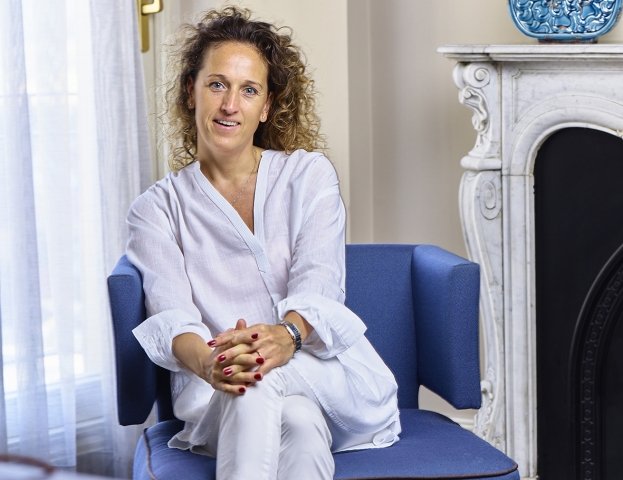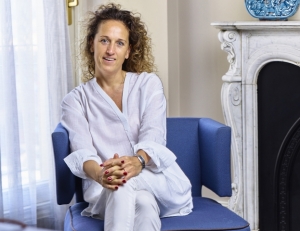Kerten Hospitality’s CEO Marloes Knippenberg Shares Plans for Footprint Expansion in Georgia
Kerten Hospitality, one of the most successful companies operating in the hospitality industry who have entered the Georgian market with 3 hospitality projects till date, hosted a gourmet lunch in Tbilisi on September 25th. Hosted by Marloes Knippenberg, CEO of Kerten Hospitality, the culinary feast was prepared by Michelin Star Chef Jaume Puigdengolas who is the Executive Chef of Kerten Hospitality. Antony Doucet, Brand, Marketing and Community Director of Kerten Hospitality was also on hand for the occasion. Guests were taken on a culinary journey with an incredible set of specialties cooked to perfection, completed by the mouthwatering San Sebastian Cheesecake.
Prior to the start of the gastronomic adventure, GEORGIA TODAY sat down with Ms. Knippenberg and found out more about the company’s history and expansion plans for Georgia.
“Kerten Hospitality started with just one brand in one country, The House Hotel. And then we had to decide what to do next,” she says. Knippenberg’s many years of experience living in different countries pointed out at the potential opportunities Eastwards – a perfect destination for expanding the global footprint of the company.
“That is how we started exploring opportunities in this part of the world. In Georgia, at the starting point of negotiations nearly three years ago, the country’s market was mostly dominated by the big international hotel chains, but there was some interesting movement going on. Since then, Georgia’s hospitality industry has undergone major shifts, with a number of remarkable hotel brands launched in the market making the country even more attractive.
Knippenberg also highlighted the recent changes in visa and tax regulations, as contributors to promoting Georgia’s popularity in terms of it becoming a go-to destination.
What are Kerten Hospitality’s three projects in Georgia?
Knippenberg has introduced the three development projects, outlining their main distinctive features. One of the group’s projects is a luxury boutique hotel located in a historical building of Old Tbilisi, is to boast 17 rooms painted by a Georgian artist in a bid to preserve the historical style of the building and is to open its doors to visitors in March next year. The group’s second project, The House Hotel and The House Residence project in the Vake district of the Georgian capital is a mixed-use project. It will feature an innovative concept integrating 53 room keys and Ouspace, an upscale food hall, serviced offices and co-working areas, as well as food and beverage facilities, thus turning the area into a lifestyle destination.
“By introducing a mixed-used project, we are creating a destination for a working as well as leisure-seeking audience. When you travel, you want to meet people from the local community, but not necessarily just to hang out: you may also establish business communication with them. Through this project, we wanted to create something that the market does not have yet and something that compliments what’s already going on here,” she says, adding that Kerten Hospitality does not aim to compete but to launch a different market segment.
Even before the launch of the hotel and food outlets, Chef Jaume started mentoring a young talented student from a Georgian cooking school who, at the age of 18, is already gearing up to run the restaurant on site after the opening next year – an initiative Kerten Hospitality has embraced to give back to the community.
The Boutique approach
The third major project is situated in the picturesque region Kakheti. Introducing this project, Ms. Knippenberg sounds enthusiastic since it supports the cultural environment with its art gallery and a collection of modern art. Alongside its 76 rooms, The House Hotel Kakheti will appeal to art aficionados for its Contemporary Art Museum Status, offering a retreat space for entertainment in the adjacent Vineyard.
“If you look at such projects, it is the right time in Georgia. It’s part luck, part opportunity, as well as a vision.”
The boutique hotel is set to be very different from the big international chain hotels in both concept and style of management. We asked the CEO about the major challenges of establishing a boutique hotel and chartering a new path in this direction.
“The challenges of doing something boutique is that you cannot take a brand and work on it. You need to work incredibly hard to bring something new to life. It is equally difficult to create a team of professionals, and you always need to create a connection with the local community to be able to launch something different and yet familiar to them. The next challenge is that even while being unique, you still need to stay a part of something bigger,” says Knippenberg.
What makes Kerten Hospitality’s portfolio of brands standout?
“What makes us really different is that we have mixed-use projects, which bring together diverse opportunities and meet owners and guests’ needs and no other operator has addressed this at the moment,” she says.
Georgia is sparing no effort to become a regional hub in various fields, including economy and education. We asked Ms. Knippenberg to share her views regarding the country’s prospects in terms of becoming a regional leader in the hospitality industry.
“Georgia has done a fantastic job in destination management. Infrastructure is of crucial importance and there are still some challenges in this regards countrywide. But, if these are overcome, I think in terms of international interest, Georgia’s potential to become a regional leader is huge.”
Georgia Today were interested to discover whether the Georgian branch of The House Hotel will have any country-specific features, or if it will follow the strict frames of the brand. “There will be no strict frames. The project will definitely have local ‘injections’. We really want to collaborate with the local artists and suppliers to bring an authentic Georgian air.”
Finally, we ased Knippenberg if she expects Kerten Hospitality’s brands to establish themselves on the Georgian market as a new and innovative statement.
“Absolutely,” she tells us with a smile.
By Ketevan Kvaratskheliya











